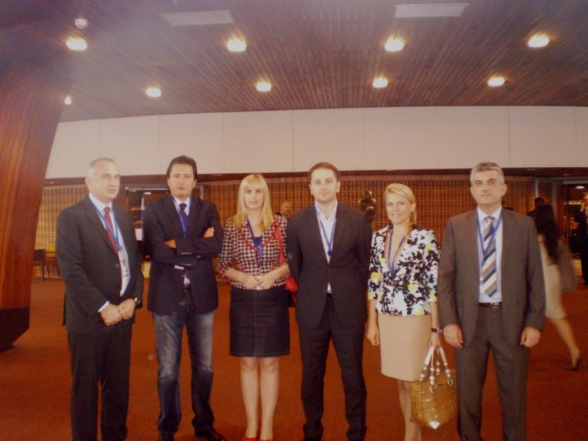The Parliamentary Assembly of the Council of Europe decided to ratify credentials of the parliamentary delegation of Iceland, which were challenged on the first day of Summer Session, emphasising that it was necessary to fulfil the rules regarding gender equality as soon as possible, in accordance with the rules of the Council of Europe. It was emphasised that the Delegation was obligated to, as soon as possible, re-establish itself so as to have at least one woman as a member of Delegation. In a Resolution adopted based on the Report of the Chairperson of the Committee on Rules of Procedure, Immunities and Institutional Affairs, Ms Nataša Vučković from Serbia, the Assembly decided to suspend Iceland Delegation’s right to vote at the Summer Session of the Parliamentary Assembly of the Council of Europe, if they do not meet the gender equality criteria until then, according to which the national delegations of the Parliamentary Assembly of the Council of Europe should have women members in their composition, at least in the same percentage as in their parliaments, or at least one woman appointed as a member. Speaking at today’s debate, the Head of the Iceland Delegation Mr Karl Gardarsson explained that the internal procedures within the Icelandic Parliament had led to that that there was not enough time to change the composition of the Delegation prior to beginning of the PACE Summer Session, and he gave guarantees that the Delegation structure would soon be in compliance with the rules of the Council of Europe.
Regarding the topic relating to combating corruption, it was emphasised the Council of Europe, the Parliamentary Assembly of the Council of Europe and its members states should be in the front rows of combating corruption. In Recommendation adopted with 117 votes “for”, one “against” and one “abstained”, based on the Report prepared by the Ms Mailis Reps, PACE urged its member states to strengthen international cooperation and re-examine their legislation relating to combating corruption. It is cited that the Assembly is determined to continue discovering new trends relating to transparency and combating corruptive risks in the parliaments.
The Committee of Ministers and the Parliamentary Assembly of the Council of Europe have been showing a strong political determination to combat corruption for years. The Parliamentary Assembly of the Council of Europe recommended to the Committee of Ministers to invite the Council of Europe member states and observer states to re-examine the current legislation on combating corruption and its implementation, with the aim to assess compliance with the leading principles cited in the Resolution 1943 (2013). In order to effectively respond to the challenges of today and tomorrow it is necessary that the states also have strategies for combating corruption. PACE recommended that the Committee of Ministers should make a set of guidelines for the rules of ethical conduct of state employees, in accordance with the principles and guidelines cited in the 2010 Recommendation on Lobbying in a Democratic Society.
In addition, the Parliament urged Committee of Ministers to recommend member states to implement, without postponing, recommendations of the Group of States against Corruption (GRECO) and Committee of Experts on the Evaluation of Anti-Money Laundering Measures and the Financing of Terrorism (MONEYVAL)
Within the third plenum debate, the Parliamentary Assembly of the Council of Europe urged member states to amend their laws and policies for the purpose of preventing anyone to be coerced to sterilisation or castration in any way or for any reason. It was announced that there was a small but significant number of coerced sterilisation and castration, and those are mainly directed against transgender people, Roma women and convicted sex offenders. Certainly, it cannot be allowed in 21st century, as stated in the Resolution adopted on the basis of the Report drafted by Ms Liliane Maury Pasquier from Switzerland. Parliamentary Assembly of the Council of Europe urged to adequate redress and financial compensation to coerced sterilisation and castration victims. It was emphasised that coerced sterilisation and castration represented serious violations of human rights and human dignity and must not be accepted in the Council of Europe member states.
For the purpose of reducing inequality in access to health care, which is especially obvious in the period of economic crisis and among members of vulnerable groups, the Parliamentary Assembly of the Council of Europe called on Member States to reduce the percentage of medical expenses paid by the socially most vulnerable population and to ensure access to health services across the country, as well as information on the health system.
In the Resolution based on reports Mr Jean-Louis Lorrain from France, adopted unanimously, the Assembly recommended Council of Europe member states to separate immigration from health policy and to eliminate the obligation of health care workers to report illegal immigrants and to introduce measures to combat corruption in the health sector, in line with GRECO recommendations. Parliamentary Assembly of the Council of Europe also recommended the Committee of Ministers to strengthen the role of the European Committee of Social Rights for the purpose of protecting the right to health.
On the fourth day, the Parliamentary Assembly will consider the following topics: Popular protest and challenges to freedom of assembly, media and speech, State interference with privacy on the Internet, Tackling discrimination on the grounds of sexual orientation and gender identity and Post-monitoring dialogue with “the former Yugoslav Republic of Macedonia”.
Delegation of the Parliament of Montenegro to the Parliamentary Assembly of the Council of Europe, consists of: Head of the Delegation, Mr Zoran Vukčević PhD, and members of the Delegation: Ms Draginja Vuksanović PhD, Mr Mladen Bojanić, Mr Predrag Sekulić PhD, Mr Damir Šehović MA and Ms Snežana Jonica








